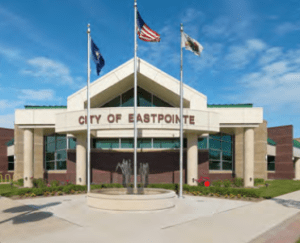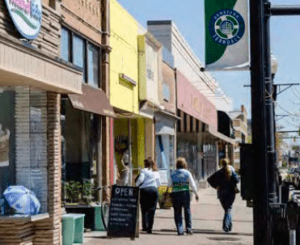Ranked Choice Voting and the Detroit Region
December 17, 2019 The Case for Election Reform in Eastpointe
The Case for Election Reform in Eastpointe
The November municipal election in Eastpointe, a suburb that shares 8 Mile Road as a border with Detroit, was one for the history books.
Not only did the working-class Macomb County community elect its first black mayor, Monique Owens, but the city also implemented, for the first time, ranked choice voting.
Instead of voting for candidates at large, voters ranked the four candidates running for two open city council seats. Voters ranked as many of the candidates as they liked, in order of preference, from one through four. Winners were required to earn slightly more than 33.3% of the votes. Choosing the winner can sometimes go into multiple rounds of tallying.
Eastpointe, the only Michigan city currently using ranked choice voting, has implemented the practice as a result of a lawsuit settlement with the U.S. Justice Department. The lawsuit filed with the City of Eastpointe in 2017 alleged that their method of election at the time allowed black citizens in Eastpointe less opportunity than white citizens to have a voice in the political process, which violates Section 2 of the Voting Rights Act. Black residents, who make up 40% of Eastpointe’s population, have been historically underrepresented in city government.
Owens, a community activist and a deputy with the Wayne County Sheriff’s Department, was elected without ranked choice voting. The mayor’s race was held with at-large voting since ranked choice voting was not required for the mayoral election under the settlement. Owens was elected as the city’s first black council member two years ago.
Harvey Curley, a former Eastpointe mayor and city council member, was among the two winners in the most recent election under ranked choice voting. Although elated at regaining office after a 19-year hiatus, Curley concedes the voting procedure was confusing for many in the city of about 34,000 residents.
Ryan Cotton, the city’s interim manager, says some residents expressed dissatisfaction with the new voting procedure and the government imposing it on the city. Others, he says, found “pride in their community being the first in the state to do this new process.”
 Ranked Choice Voting’s Uphill Battle in Ferndale
Ranked Choice Voting’s Uphill Battle in Ferndale
Along with voter apprehension, ranked choice voting also faces technical and legal hurdles in another city in Michigan. In Ferndale, voters approved its use for municipal elections in 2004. Yet ranked choice has never been implemented there, initially because voting technology couldn’t properly tabulate ranked choice votes, and more recently because state officials believe the method violates state election law.
Ferndale Clerk Marne McGrath says the issue may have lost some urgency because there have been fewer candidates in Ferndale in the years since the referendum, but she believes city voters continue to support the idea.
“It’s been frustrating,” she says. “I think our voters still want it. I’m hoping maybe we can [for municipal elections] in 2021.”
An analysis by the state Bureau of Elections Director Sally Williams finds that because Michigan state law was drafted under the assumption of winner-take-all elections, widespread adoption is problematic.
“Ideally, the Michigan Election Law would be amended to establish detailed procedures for conducting city elections using the ranked choice voting method [before 2021],” Williams writes.
Greg Tasker is a Michigan-based freelance writer. Dawson Bell is a veteran Michigan journalist who spent 25 years covering government and politics for the Detroit Free Press.
